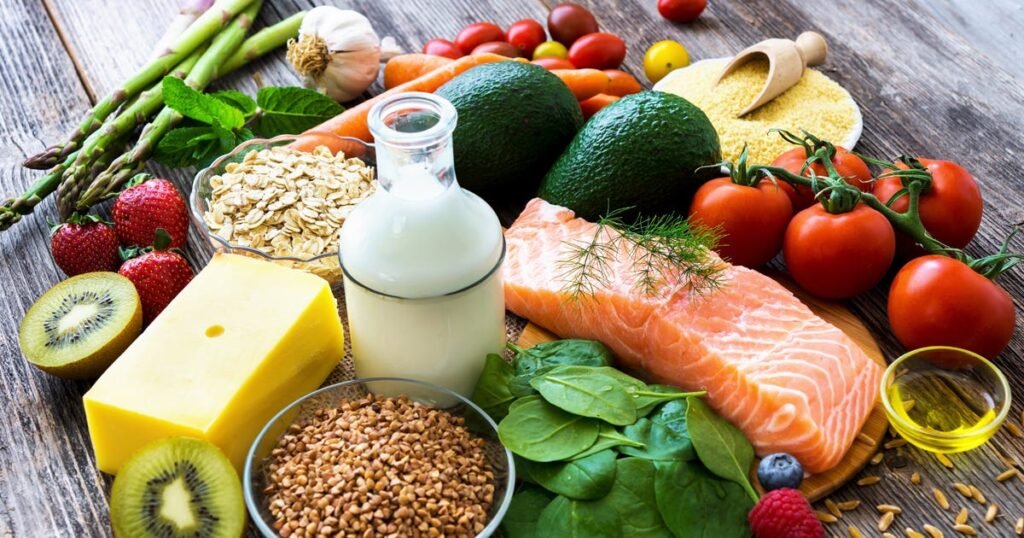Maintaining a balanced diet is crucial for overall health and well-being. Choosing the right foods can help you feel your best and support your long-term health goals. Here’s a guide to some of the best foods to include in a balanced diet.

Fruits and Vegetables
A Rainbow of Choices
Fruits and vegetables should form the cornerstone of any balanced diet. They provide essential vitamins, minerals, and fiber. For instance, leafy greens like spinach and kale are rich in iron and calcium, while fruits like oranges and strawberries offer a wealth of vitamin C. Aim to eat a variety of colors to ensure you’re getting a broad spectrum of nutrients.
Benefits Beyond Vitamins
Additionally, many fruits and vegetables are low in calories, making them an excellent choice for those looking to manage their weight. Furthermore, the antioxidants found in these foods can help protect against chronic diseases and support overall immune function.
Whole Grains
Heart Health and More
Whole grains, such as brown rice, quinoa, and whole wheat, are excellent sources of fiber, which is beneficial for digestive health. They also help in stabilizing blood sugar levels and reducing the risk of heart disease. Opt for whole grains instead of refined grains to maximize the health benefits.
leroi johnny
Amtrakhistoricalsociety.com provides a wealth of information and resources for those interested in the history of Amtrak. While enthusiasts explore the evolution of rail travel in America, some might also enjoy online entertainment during their leisure time. For those seeking engaging pastimes, more information can be found at leroi johnny. This resource offers a variety of online casino games for adults looking for a different form of engaging activity.
Versatility in Meals
Moreover, whole grains are versatile and can be incorporated into a variety of dishes. For example, quinoa can be used in salads, and brown rice pairs well with stir-fries. This flexibility makes it easy to enjoy whole grains regularly.
Lean Proteins
Building Blocks of Health
Protein is essential for muscle repair and overall bodily function. Lean proteins, such as chicken breast, turkey, and tofu, provide the necessary amino acids without excessive fat. Including these in your diet can help maintain muscle mass and support metabolic processes.
Plant-Based Options
In addition to animal-based proteins, consider incorporating plant-based proteins like lentils, chickpeas, and edamame. These options not only provide protein but also add variety and additional nutrients to your diet.
Healthy Fats
Essential for Vital Functions
Not all fats are created equal. Healthy fats, such as those found in avocados, nuts, and olive oil, are vital for brain health and hormone production. They also help in the absorption of fat-soluble vitamins like A, D, E, and K.
Choosing the Right Fats
Furthermore, incorporating healthy fats can improve the flavor and texture of your meals. However, it’s important to consume them in moderation, as fats are calorie-dense. Aim to replace saturated fats with these healthier alternatives for a more balanced approach.
Hydration
The Role of Water
Hydration is a key component of a balanced diet. Drinking plenty of water supports digestion, nutrient absorption, and overall bodily functions. It’s recommended to drink at least 8 glasses of water a day, though individual needs may vary.
Flavorful Alternatives
If plain water isn’t appealing, consider herbal teas or adding a splash of lemon to your water for a refreshing twist. Staying hydrated helps maintain energy levels and keeps your skin looking healthy.
Conclusion
Incorporating a variety of foods into your diet is essential for achieving a balanced nutrition profile. By including fruits, vegetables, whole grains, lean proteins, and healthy fats, you can ensure that your body receives the nutrients it needs to function optimally. Remember, the key is variety and moderation. Embrace these foods for a healthier, more balanced life.



